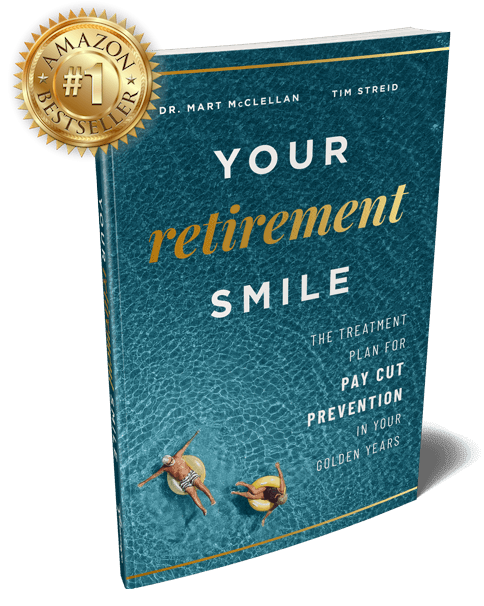Dentists and orthodontists juggle work, family and community responsibilities, with little time for a game of golf or planning for the future. When we ask dentists: “How do you expect to spend your money in retirement,” most answer “We are just going to live off the interest of what we’ve saved.”
The fact of the matter is nobody can live off the asset’s interest, whether it’s a CD or a savings account (typically generating 1-4%). Example: If you have $1,000,000 and you are earning 2% on that investment, that’s generating $20,000 interest. Face it: That $20,000 won’t cover your living expenses…let alone a Tahiti trip.
Retirement Strategy: Solo Vs. Professional Help
According to U.S. News & World Report, running out of money is a retiree’s greatest fear. Retirement income replacement planning is key for savvy dentists and orthodontists who want to alleviate this fear. That’s why you need a good financial advisor who understands the dental and medical business.
At our firm, we work with dentists, orthodontists, and really any health professional to grow their income and diversify their financial products to include a mix of life insurance, disability insurance, structured equity and bond investments, annuities, business overhead insurance, retirement and long-term care plans.
Whether you’re near retirement or just starting your practice, now is the time to seek professional financial input and create your road to a happy retirement and ultimate financial success.
Invest Without Stress – Get Professional Help
Let’s say Dr. Jones is 60 years old, married and saved a nice nest egg. Those funds have a lot of pressure on them. They have to provide income for BOTH he and his wife during their retirement l, which could extend 35 years. And, if they want to leave some money to their kids, grandkids or a charity, it’s all coming out of their savings and earned interest.
If Dr. Jones is going at it solo or doing it himself, and the stock market fluctuates and interest rate changes as they always do, he has no control over how his investment will react. Add to that life or health changes requiring long-term care for he or his wife or runaway inflation, and you’ve got a heap of worry.
If Dr Jones has a 401 K plan and investments in place from years ago with the help of a financial advisor, he needs to re-evaluate that financial plan/investments and update it to reflect the current markets.
Many of our dentists look to retire or be in a position to retire at 60 or 62. Since that is relatively young, their savings have to last over a long period of time. Today’s standard recommendation for retirees is a 3-4% withdrawal rate off their entire nest egg, but with a 35 year projected life span, Dr. Jones and his wife could still run out of money. If Dr. Jones has a million dollars saved, three years into retirement he may only have half that savings due to spending and market changes. Ask retired people that have lived through significant market downturns, like in 2008, it happens!
So ask yourself; Why should you take a 50% pay cut in retirement because you didn’t seek strategic, economically-sound financial advice from a firm such as ours?
What’s The Answer?
The first step is to evaluate where the dentist is today on the road to retirement and provide a personalized, strategic plan. Most dentists we initially see have only two or three sources of income (Social Security, a retirement plan and their dental practice).
We show them what they can expect if they continue with their current plan (or lack of one) and help them position their assets in a balanced way to provide them with significantly more income during retirement with the ultimate objective of full income replacement. Our basic approach?
- Review all of the current financial products and their rates of return.
- Create more efficient ways to manage their assets (retirement plans, investment accounts, savings, real estate and mortgages).
- Compare different financial scenarios and market outlooks and customize their plan.
- Create an exit strategy that doubles income in retirement at 7-8% distribution rates, not 3-4%.
- Diversify all assets in a more strategic way by creating multiple streams of income that will include permanent life insurance, investments, real estate, and revise the retirement plans.
- Factor in Social Security, interest or dividends on investments, spending down assets, rental income, charitable trusts, cryptocurrencies, collectibles and other ways to maximize income sources in retirement.
CPA and financial advisor, Tim Streid and orthodontist, Dr. Mart McClellan, are presidents of Macro Wealth Management, which is a firm that caters to the dental and medical professional. Utilizing a economically-based financial model to create short and long-term strategies for the future, they are the only dental-focused firm in America that uses this system and has a dentist on the team as an advisor. Both are Registered Investment Advisors (RIA) and registered in multiple states in the areas of securities and life/disability insurance. They are authors of the new Forbes book “Your Retirement Smile: The Treatment Plan for Pay Cut Prevention in Your Golden Years.
For a free consultation with Macro Wealth Management, contact us at

